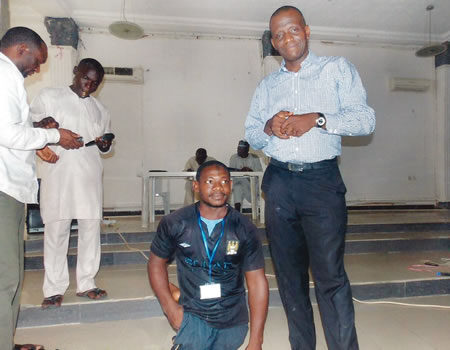Unemployment in the country is no doubt on a high side even among the able-bodied. For the physically-challenged it is more difficult getting a job; but for 30-year-old Mallam Dantala Ibrahim Abubakar, who decided to seize the opportunity offered by a World Bank training programme to make himself self-employed, it is like he had just wasted his time.
The training programme tagged Youths Empowerment and Social Supports Operation (YESSO) an initiative of the World Bank, was in collaboration with the Federal and Niger state governments.
Today, though the training had ended a year ago, Abubakar, like other graduates of the programme are not happy that their conditions had not improved. He let out his frustrations in an interview with Sunday Tribune.
“I was a trainee of a World Bank-assisted programme for the poorest of the poor which was supported by the Federal and Niger state government in collaboration with the Niger State office of the National Directorate of Employment (NDE).
“In my own perception of the programme as an active participant and a beneficiary, it was very good, because among other things, they told the 1018 trainees including myself how to cooperate with one another, and how to cultivate love and friendship among ourselves as well as the opportunity of being self employed at the end of the programme,” he said while reflecting on the programme..
Speaking further on his frustrations, he told Sunday Tribune that at the commencement of the nine- month training period from March to December last year, the state government had promised to give him and other participants Starter Packs.
He, however, lamented that up till date, Governor Abubakar Sani Bello is yet to fulfill his promise in order for the trainees to be able to put into practice what they had learnt, one year down the line.
Abubakar, while speaking on his disability said he was he was not born physically-challenged. According to the story told by his parents, he was struck by a strange disease, which was later discovered to be polio when he was barely eight months old. This led to his being crippled on both legs.
“My parents said they fought vigorously in order to see me survive the sickness, but in the long run, I became crippled due to no fault of my parents and as a Muslim, I believe that was what God wanted me to be.
“I am happy the way I am because everything is from God, but I do not like going to beg people for alms or for any kind of assistance in order to feed my family because I am a married man with one wife and three children – one boy and two girls – between the ages of one and six.
“I am therefore appealing to the state governor, Alhaji Abubakar Sani Bello to look into the possibilities of fulfilling the promise made to the 1,018 graduates of YESSO in the state including myself who had been kept guessing and unattended to by the government since last year December when the training programme was rounded off by the World Bank, the Federal Government and the NDE, in collaboration with the Niger State government,” he stated.
Speaking further, Abubakar said the World Bank and the Federal government had done their own parts very well. This, he said, included financial support for transportation fares throughout the nine months duration of the training with the sum of N7, 500.00 on a monthly basis including feeding.
Abubakar, a National Diploma graduate of Secretarial Studies from the Niger State Polytechnic, Zungeru, who decried the resort to begging for alms by most physically challenged persons in part of the country noted that while still under training he used the monthly stipends of N7, 500.00 being paid to him by the World Bank Officials and the Federal government to support his family and also saved some money which he ploughed back into his GSM recharge cards business.
Similarly, some other 10 beneficiaries of the programme who spoke with the Sunday Tribune in separate interviews said that they had succeeded in putting their resources together to form a Farmers’ Cooperative society and registered with the Niger State Ministry of Investments.
According to the 30-year old chairman of the group, Malam Maiyaki Idris, “we are among the 2018 beneficiaries and graduates of the World Bank initiative called YESSO.”
He explained further that the cooperative society was formed around January this year with the aim of being self employed by moving into agricultural business after the training.
Idris, a graduate of the Niger State College of Education, Minna, said,» we felt it was very important to find something doing for ourselves, instead of sitting at home awaiting endlessly for white collar jobs. And presently, we are into crop farming on three hectares of land in a village called Piou, under Bosso Local Government Area of the state.»
“We planted millets for a start at the beginning of the year, and that was the only thing we could do then by contributing money among ourselves out of the stipends we got from the federal government individually throughout the nine-month duration of our training. And the duration of the harvest period is dependent on the type of the seeds that we planted,” Idris stated.
However, the state government has said it was not intending to renege on its pledge to the aggrieved YESSO, beneficiaries with regards to the Starter Packs promise.
The State Commissioner of Information and Strategy, Alhaji Danjuma. Salau, in conjunction with his counterpart in the ministry of Youths and Sports, Mr. Emmanuel Danjuma Dusa said the state government was working to settle all those involved in the training.
“We will make effort to redeem our pledge for the Starter Packs to them. Definitely, we are going to raise the issue with the state governor, Alhaji Abubakar Sani Bello, very soon. He may not have been aware that the 1,018 youths have not been given the Starter Packs said to have been promised them by the State government at the time,» said Alhaji Salau
Meanwhile, as Mallam Abubakar and his fellow trainees await government’s response to set them up in business, some people are suffering for the delay. Unfortunately, practice as they say, makes perfect. If the trainees could not practise what they had learnt one year ago, government’s efforts at training them in the first place would have failed as they would need further training to be able to start off again.






